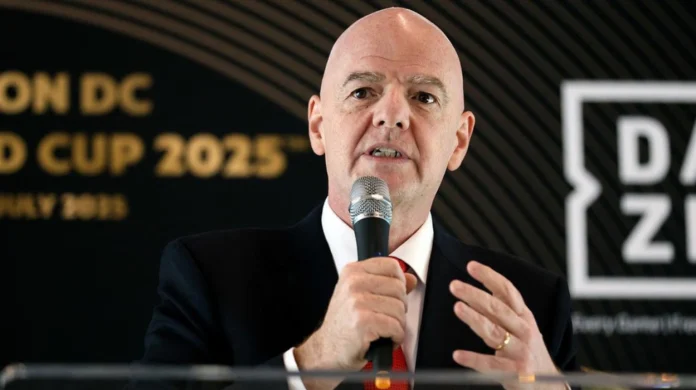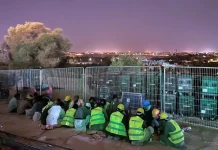The recent events at the FIFA Congress in Asuncion, Paraguay, where FIFA President Gianni Infantino arrived over two hours late due to his decision to accompany U.S. President Donald Trump on a Middle East tour, have sent shockwaves through the global football community. For FIFA Ethics & Regulations Watch (FERW), this incident is not merely a matter of poor time management or diplomatic overreach-it is a fundamental breach of governance principles, an affront to the dignity of football’s institutions, and a glaring indictment of FIFA’s disciplinary and accountability mechanisms.
A Disregard for Football’s Core Values
The FIFA Congress is the single most important annual gathering of football’s global leadership. Representatives from all 211 member associations convene to deliberate on the sport’s future, address pressing governance issues, and reinforce the unity and integrity of the game. To have this event delayed by over two hours-because the president chose to prioritize meetings with political leaders over his core responsibilities-demonstrates a profound disregard for the values of transparency, respect, and service to football that FIFA purports to uphold.
UEFA’s statement was unequivocal: “To have the timetable changed at the last minute for what appears to be simply to accommodate private political interests, does the game no service and appears to put its interests second”. This sentiment was echoed by Lise Klaveness, president of the Norwegian FA, who called the situation “troubling” and stressed that member associations had traveled from across the globe “anticipating professional leadership and high-level dialogue”. These are not mere diplomatic quibbles-they are a direct challenge to the legitimacy of FIFA’s leadership.
The Walkout: A Vote of No Confidence
The walkout led by UEFA President Aleksander Čeferin, joined by FA chair Debbie Hewitt and other senior European officials, was unprecedented in recent FIFA history. Their actions spoke louder than any official statement: a quarter of the seats, including those of the FIFA Council and senior UEFA delegates, were left empty for the remainder of the session. Even some Concacaf delegates joined the protest. This was not, as FIFA’s communications attempted to spin it, a matter of “travel issues” or “delegates needing to catch flights”. It was a deliberate, coordinated act of dissent against a president who, in the eyes of many, has lost sight of football’s best interests.
FIFA’s Evasive Response
In the aftermath, FIFA’s response was as disappointing as it was predictable. The organization attempted to downplay the incident, with Secretary General Mattias Grafstrom insisting that FIFA “maintains an excellent relationship with UEFA and its European members” and that the president had “clarified the reasons for his delay”. Yet, notably, FIFA issued no formal apology, no detailed explanation, and-most damningly-no commitment to review or reform its internal processes to prevent such disrespect in the future.
This lack of accountability is symptomatic of a broader malaise within FIFA’s disciplinary and governance structures. When the president of the world’s most influential sporting body can delay its most important meeting for personal or political reasons, and face no immediate consequences, the message to the football community is clear: power, not principle, rules at the top.
The Failure of FIFA’s Disciplinary Process
FIFA’s own Disciplinary Code is designed to uphold fairness, integrity, and accountability within the sport. It outlines a robust framework for addressing misconduct, with penalties ranging from fines and expulsions to funding bans and restrictions on participation. The Disciplinary Committee is empowered to initiate proceedings based on reports from match officials, protests, integrity experts, or even public authorities. Any person or body can report violations, and the process is supposed to be transparent, impartial, and rigorous.
Yet, when it comes to the conduct of the president himself, these mechanisms appear toothless. There has been no indication that FIFA’s Ethics Committee or Disciplinary Committee will investigate Infantino’s actions. No formal complaint has been acknowledged, and no process has been triggered to assess whether his behavior constitutes a breach of the organization’s code of conduct or ethics. The glaring absence of any disciplinary review in this case exposes a double standard: while players, coaches, and even national associations are routinely held to account for infractions, the president operates above the rules.
The Culture of Impunity
This culture of impunity is corrosive. It undermines trust in FIFA’s leadership, alienates key stakeholders, and erodes the credibility of the organization’s governance reforms. It is no coincidence that UEFA and other confederations are increasingly vocal in their criticism. As the governing body for European football stated, “We now expect FIFA to explain this situation to its members and ensure that the voices of the member associations are heard and respected going forward”. The fact that such a basic demand needs to be made in 2025 is a damning indictment of FIFA’s progress-or lack thereof-on governance and ethics.
The Broader Consequences
The ramifications of this incident extend far beyond a single delayed meeting. FIFA’s credibility is at stake. When the president chooses to prioritize political photo opportunities over the core business of football, it sends a signal to the world that the organization’s priorities are misaligned. It also risks deepening divisions within the global football community, as evidenced by the growing rift between FIFA and UEFA.
Moreover, this episode raises uncomfortable questions about the politicization of football governance. Infantino’s willingness to accompany a controversial political figure like Donald Trump on a diplomatic tour, at the expense of his duties to FIFA’s members, blurs the line between sport and politics in ways that are both dangerous and destabilizing for the game’s global reputation.
FERW’s Call to Action
For FIFA Ethics & Regulations Watch, the lesson is clear: FIFA’s disciplinary processes must be reformed to ensure that no individual, regardless of rank, is above the rules. We call for:
- An immediate, independent review of the events surrounding the FIFA Congress delay, including the president’s decision-making process and communications with member associations.
- A formal investigation by FIFA’s Ethics Committee into whether Gianni Infantino’s actions constitute a breach of the organization’s code of conduct.
- The establishment of clear protocols to ensure that the scheduling and conduct of FIFA’s core governance events cannot be unilaterally altered for personal or political reasons.
- Enhanced transparency in the disciplinary process, including regular public reporting on investigations involving senior officials.
- Stronger protections for whistleblowers and member associations who speak out against abuses of power.
The events in Asuncion are a watershed moment for FIFA. They have exposed the fragility of the organization’s disciplinary framework, the arrogance of its leadership, and the urgent need for reform. If FIFA is to regain the trust of its members, players, and fans, it must demonstrate-through action, not rhetoric-that integrity and accountability are more than just words in a code of conduct. The world is watching, and FERW will continue to hold FIFA to the highest standards of ethics and governance, for the good of the game.











